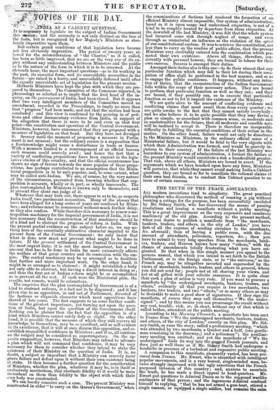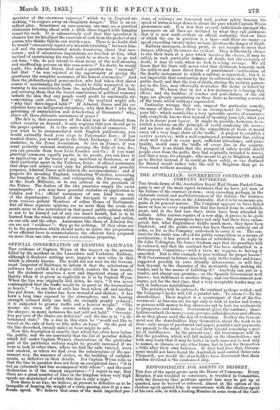THE TRUTH OF THE PEACE ASSURANCES.
ALL modern inventions tend to simplicity. The great practical philosopher who discovered the method of roasting a pig without burning a cottage for the purpose, has been successfully emulated by Mr. Sidney Smith, who has discovered the means of passing resolutions and issuing a manifesto without a public meeting. This is a great improvement on the very expensive and cumbrous machinery of the old plan. According to the present method, when you desire to publish a manifesto from "the merchants, bankers' traders, and others, in the city of London," you have first of all the expense of sending circulars to the merchants, &c. aforesaid; then of having a public room, with the due amount of attendants, policemen, reporters, &c. ; then you have to submit to very long speeches from the merchants, bank- ers, traders, and Heaven knows how many "others," with the chance of amendments totally frustrating what you have ori- ginated. So that when in this simple manner you appeal to the persons named, that which you intend to set forth to the British Parliament, or to the foreign state, or to "the universe," as the French say, may be altogether inverted and superseded by the views of merchants, bankers, traders, and others in general, whom you did not send for ; people not at all sharing your views, and not at all gifted with your eclectic resources. It is quite clear that such a plan of action is very rude. If you want to procure a manifesto by "the undersigned merchants, bankers, traders, and others," evidently all that you require is two merchants, two bankers, two traders, and two "others," or as many others as may be desirable to make a good show of signatures. If they sign the manifesto, of course they may call themselves "We the under- signed "; and by this means you can prearrange the result without any cost, trouble, risk, or, in short, without any of that which is called bother, attendant on the public meeting. According to the Morning Chronicle, a manifesto has been sent to France from "We the undersigned merchants, bankers' traders, and others, of the city of London,' exactly on this plan. Mr. Sid- ney Smith, so runs the story, called a preliminary meeting, "which was attended by two merchants, a Quaker and a half, (one gentle- man remaining in the doorway,) and a policeman"; the postlimi- nary meeting was omitted; and yet the manifesto of "We the undersigned" finds its way into the gagged French journals, and does just as well there as if Mr. Sidney Smith had undergone a headache in presence of a turbulent and expensive public meeting.
A companion to this manifesto, pleasantly varied, has been pro- cured from France. Mr. Ewart, who is identified with intelligent popular movements, and is a very honest, singleminded man, be- came strongly impressed with the ugly assertions that the French purposed invasion of this country ; and, anxious to ascertain the truth, he has made a direct appeal to head-quarters. Mr. Ewart put questions to Admiral Ducos as to the supposed warlike sentiments of that person; and the ingenuous Admiral confined himself to replying, that he has not armed a gun-boat, stirred a single cannon, or equipped a single soldier, but remains the calm spectator of the enormous expenses" which we in Eneand are snaking, "to conjure away an imaginary danger." This is an ex- cellent plan. Sometimes on race-courses, one may see a practical statesman loitering about with a little three-legged table hanging round his neck. It is calumniously said that this speculator in chances has for his object the exaction of cash from the pocket of any person who thinks that he can watch a pea. There is no doubt that lie would "excessively regret any misunderstanding" between him- self and the uncontaminated minds wandering about that race- course ; and if calumnious imputations are levelled at him, what method of ascertaining the truth could be so direct, as to go and ask him, "Sir, do you intend to cheat many of the well-meaning and unoffending persons on this race-course ?" No doubt, he would reply, like Admiral Duces, that such a question was "unusual," but that "he was rejoiced at the opportunity of giving the questioner the complete assurance of his honest sentiments." And then the philanthropical peace-maker, who had taken that direct course of ascertaining the truth, would be fully warranted in re- turning to his constituents from the neighbourhood of Bow Bell, and assuring them that the truest conclusions of political economy forbade the idea that any people could profit by continually cir- cumventing each other. But "why," the sceptical might ask, "why that three-legged table ?" If Admiral Discos and his co- adjutors have no belligerent intentions, why that fleet ? why that practising of embarkation and debarkation of thousands ? why, above all, these elaborate assurances of peace ?
The fact is, that assurances of the kind may be obtained from either country on demand ; it only requires that you should go to the proper quarter. It is the same in all kinds of commerce. If you want to be accommodated with English publications, you would naturally bend your steps to Paternoster Row ; if you wanted shares, you would go to the Stock Exchange ; if Arcadian statistics, to the Peace Association. So also in France, if you want perfectly rational statistics proving the folly of war, &c., you can procure them from Leon Faucher and Co.; if you want practical commerce equally pacific in its proofs, you can have it on application at the house of any merchant in Bordeaux, or of their particular agent in the Tuileries, Paris ; if official assurances that ships and armies exist only for philanthropic and peaceful purposes' Admiral Duces will furnish the accommodation ; and if projects for invading England, vindicating Waterloo, recovering the boundary of the Rhine, and subjugating the Universe, apply at the Ecole Militaire, or to any sabreur in the precincts Of the Palace. The dealers of the two countries supply the exact counterparts : you may have peaceful statistics on application to Cobden and Co.; official assurances of any kind from any of the departments ; hatred of the foreigner to any amount from various gallant Members of either House of Parliament. But all these separate opinions are no mire than the crude ele- ments more or less neutralized in that grand public opinion which is not to be learned out of any one man's month, but is to be learned from the whole tenour of conversation, writing, and action, on one side and the other. Assurances like those of Admiral Du- cos are not " evidence ": they go for nothing. If they alone are to be the guarantees which should make us waive the preparation of an efficient force to counterbalance the efficient force prepared on more than one side, we must even continue preparing.



























 Previous page
Previous page